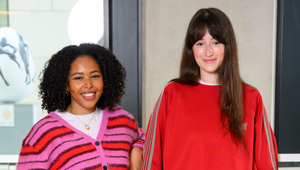
OK Go & Trish Sie in Conversation

Budding directors who fancy themselves as the next big thing have still got time to enter Saatchi & Saatchi and Ok Go’s Music Video Challenge. OK Go’s lead singer Damian Kulash talks to director Trish Sie, about making standout music videos, and what it’s like directing your own brother!
TS> There are only a few days left for directors to enter the OK Go Music Video Challenge. What's your advice for people still putting the finishing touches to their entry?
DK> When someone is in the final sprint of a project they're passionate about, they don't need advice. Or at least they certainly don't want it. My only message is of encouragement because the only danger, in that last manic burst of effort, is settling. When you're all spun out from working too hard and there's 72 hours of work to get done in the next 10 hours, that's when people start making the ‘pragmatic’ decision to go with the B+ option, because the window for getting A+ appears to be closing. But, in the long run, I don't think B+ is ever the pragmatic decision. Have faith in yourself, brew stronger coffee, tell the people you're working with that you love them and they are doing a great job. If you don't have enough hours or people to get to A+, go get more hours and people. Beg your friends and sleep as little as you are able to handle without being an asshole to everyone.
TS> The band has starred in all of your previous videos. How can a budding director come up with a unique music video without the band featuring?
DK> There are lots of reasons someone might watch a video, and only one of them is to find out what the band looks like. Think of how few of your favourite films have the exact same four people in them. You don't need us to make a good video. A good idea and good filmmaking (and hopefully a good song) make a good video. The only reason we're in our own videos when we make them is: we get to be. If someone's going to get to play with dogs for a few weeks or spend months building a Rube Goldberg machine or learn to stunt drive a car, I want to be that person.
TS> What do you think are essential qualities a director needs to make it in the Internet-led music video universe?
DK> Clear creative instincts; a strong, unwavering internal compass with respect to what's good and bad. Yes, the details of filmmaking (and music-making, and art-making, and everything-making) are going through dramatic changes, as are the modes of distribution/consumption/interaction of/with anything we make. But navigating this creative world successfully doesn't happen by absorbing and exploiting each or all of the individual technological and industrial changes. It happens by developing great sea legs, by getting comfortable with the state of chaos and learning to know your good ideas from your bad ideas on their own merits, without needing a stable backdrop for context. It's all changing too fast for norms and standards and customs to develop in time for us to rely on them to guide our creative processes. The people who do well in this consta-flux do well because their decisions come from a clear, internal sense of what is good and what is bad. No matter how the world around them shifts, the individual choices they face appear to them as black and white.
DK> In 2007 you were selected for the Saatchi & Saatchi New Directors' Showcase for the OK Go Music video that famously features the band dancing on treadmills. Any advice for young filmmakers entering the OK Go Music Video Challenge, on how to make a standout video?
TS> My best advice is NOT to try and make a standout video. Just make something that interests you. If it's sincere, original and well executed, it will stand out by those virtues alone. Take something you find fascinating or beautiful or strange and explore every inch of it until you understand all you can about it. Figure out where it intersects with the music, what can bridge the gap between the two and make them part of one another. Then go back to where you started, the nugget of an idea you had in your head, and really ask yourself if you did everything you could to be true to that idea. If some little part of you knows you left some stone uncovered, listen to that little part of yourself and go uncover that stone. Be brutally honest. Then film it.

DK> You've choreographed several music videos for OK Go. What's it like directing a relative?!
TS> You and I finish each other's sentences and speak in wild code and crack each other up and are attracted to the same sorts of stuff and notice the same things at the same time... and we also piss each other off like no one else in the world can. So it's both the most wonderful and the most challenging of work experiences. But mostly wonderful. When we create, it's crucial to surround ourselves with people we trust, trusted collaborators whose aesthetic and work style compliment and push forward our own. It doesn't ultimately matter if these people are related to us, as long as we have that trust and understanding.
DK> Is it important for a director to develop a recognisable style?
TS> Individual style is crucial! But I'm not sure developing a style is something one can consciously strive for. If you always make work that expresses your own interests and compulsions and obsessions and rhythms, then your own personality will emerge in your work. You can't help it!















